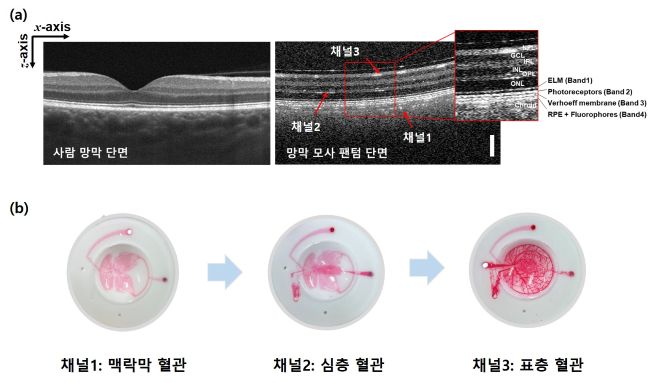DAEJEON, Sept. 30 (Korea Bizwire) — South Korea’s national standards institute has unveiled an artificial eye designed to mimic the human retina, a breakthrough aimed at improving the accuracy of diagnostic imaging for retinal diseases.
The Korea Research Institute of Standards and Science (KRISS) said Monday it has developed a “retinal phantom,” a synthetic model that replicates the retina’s layered structure and microvascular network with more than 90 percent fidelity.
The device can be inserted into ophthalmic imaging machines to evaluate and calibrate their performance.
Retinal phantoms function much like crash-test dummies in automotive safety, providing a controlled standard against which equipment can be tested.
Unlike earlier models, which simulated only parts of the retina, the new phantom reproduces all 13 structural layers, curvature, blood vessel networks, blood flow and even natural retinal autofluorescence.

Structure of the artificial eye phantom developed by KRISS (Image provided by the Korea Research Institute of Standards and Science)
The tool allows for objective measurements of imaging resolution, field of view and other key performance factors across devices such as optical coherence tomography (OCT) and fluorescein angiography, which are widely used in ophthalmology.
By addressing inconsistencies across hospitals and manufacturers, KRISS hopes to establish a standardized benchmark for retinal diagnostics.
The institute said the phantom could be used not only in clinical calibration but also during prototype development and quality control in production lines for retinal imaging devices.
“This provides a new standard for medical devices that will enhance the precision of retinal disease diagnosis and monitoring,” said Lee Sang-won, head of KRISS’s nano-bio measurement group.
The development comes as retinal diseases, which can cause irreversible vision loss, remain a growing public health challenge, making early detection and reliable monitoring essential.
Kevin Lee (kevinlee@koreabizwire.com)

